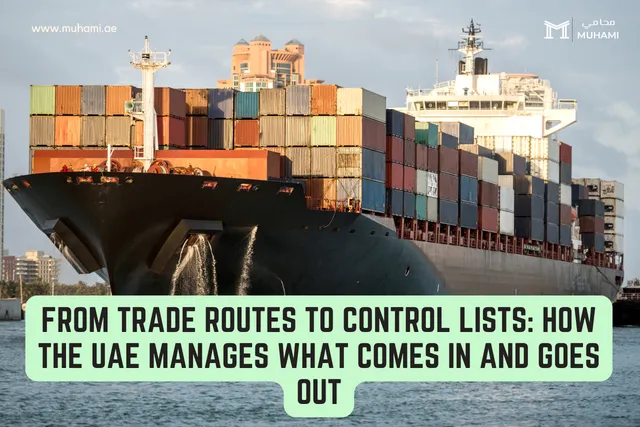From Trade Routes to Control Lists: How the UAE Manages What Comes In and Goes Out

When we think of the UAE, we often picture glittering skylines, bustling free zones, and containers stacked high in Jebel Ali Port one of the busiest in the world. Trade has always been the lifeblood of this region. From the early pearl divers and spice traders to today’s global logistics giants, the UAE has stood at the crossroads of commerce.
But with great trade comes great responsibility. Not every good can flow in or out freely. And that’s where the UAE’s import and export control laws step in balancing the country’s openness with security and compliance.
The Story of a Shipment That Wasn’t Ordinary
Imagine you’re an electronics company in Dubai. You’ve got a deal with a client in Europe for specialised sensors. Everything looks routine until customs asks:
“Do these sensors appear on the UAE Control List?”
Suddenly, you realise what seemed like a harmless shipment may fall under dual-use technology; goods that can serve both civilian and military purposes. Without the right permit, your shipment is stuck. Worse, you could face heavy penalties.
This is not a rare scenario. Businesses dealing with chemicals, aerospace parts, telecom equipment, even advanced software often bump into the Export Control Law (Federal Decree-Law No. 43 of 2021).
What’s Actually Controlled?
The UAE keeps a Control List — a catalogue of sensitive items that need permits for import, export, re-export, or even transit. These include:
- Nuclear, chemical, or biological materials
- Armored vehicles and defense equipment
- Sophisticated electronics, navigation, and telecom gear
- Riot control tools and security equipment
At the same time, there’s the “restricted vs prohibited” rule:
- Prohibited goods: narcotics, counterfeit currency, items offensive to Islamic values — these never cross the border.
- Restricted goods: animals, fertilisers, medical devices, weapons — allowed, but only with the right approvals.
The Gatekeepers
Oversight doesn’t lie with one entity. It’s a coordinated effort:
- The Executive Office for Control & Non-Proliferation (set up in 2022) manages licensing for controlled goods.
- The Dubai Customs and other emirate-level authorities enforce day-to-day compliance.
- Free zones have their own checkpoints, but always aligned with federal law.
Why This Matters for Businesses
For many companies, this isn’t just “red tape.” It’s the difference between seamless trade and being on the wrong side of the law. Non-compliance can mean:
- Shipment seizures
- Fines in the millions
- License suspensions
- Even criminal liability in serious cases
On the flip side, businesses that follow the rules gain trust, smoother customs clearance, and a stronger reputation internationally.
Practical Takeaways
- Classify before you commit: Always verify if your goods fall under the Control List.
- Know your end-user: Who’s buying and for what purpose matters as much as the goods themselves.
- Work with advisors: Licensed clearing agents or legal consultants can save you costly mistakes.
- Keep records: In audits or disputes, paperwork is your strongest shield.
Final Word
The UAE thrives because it welcomes trade but never at the expense of security or compliance. As business leaders, it’s on us to know these frameworks — not as obstacles, but as safeguards that keep our markets strong and credible.
Next time you see a container ship dock in Dubai, remember: behind every shipment is a system designed to protect trade, not stop it.
👉 What’s your experience with UAE’s trade compliance? Have you ever faced a delay or challenge because of export/import rules?
Any Questions?
Connect with lawyers and seek expert legal advice
Share
Find by Article Category
Browse articles by categories
Featured Partnership
Elevate HR and Search
HR Advisory | Search | Coaching
Related Articles

Property Ownership and Inheritance in D…
Buying property in Dubai is more than a transaction; it’s a long-term com…

Property Ownership and Inheritance in Dubai: Prot…
Buying property in Dubai is more than a transacti…

The OpenEvidence - Doximity Dispute: AI…
Two of the largest AI-driven healthcare platforms are clashing in court. OpenEv…

The OpenEvidence - Doximity Dispute: AI in Health…
Two of the largest AI-driven healthcare platforms…

FTC Probes AI Chatbots: Child Safety Un…
The Federal Trade Commission announced on September 11, 2025, that it issued or…

FTC Probes AI Chatbots: Child Safety Under Scruti…
The Federal Trade Commission announced on Septemb…

